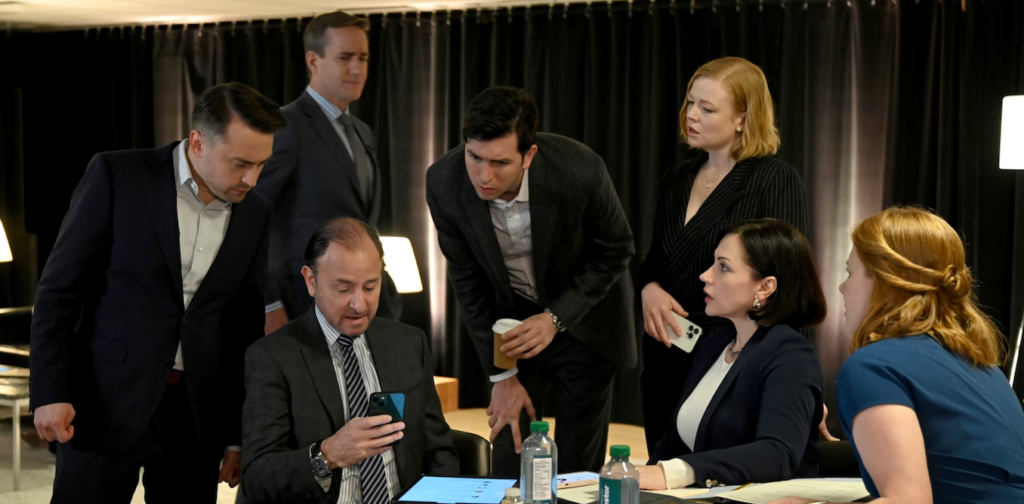Succession is as much about technology as it is about money, power and family

Warning: the following article contains spoilers.
Technology is key to Succession’s tale of the Roy family media dynasty, with the drama playing out on screens within the show and in the homes of the viewers beyond it.
The final series is no exception. This is best illustrated in episode three, Connor’s Wedding. The siblings, Kendall (Jeremy Strong), Roman (Kieran Culkin) and Shiv (Sarah Snook) – Connor (Alan Ruck), as always, is left out – find out through a phone call with Shiv’s husband Tom (Matthew Macfadyen) that their father Logan (Brian Cox) has suffered a heart attack and that they must say their goodbyes.
Through technology – Roman’s iPhone and Tom’s Samsung, propped against Logan’s ear – the children share their emotional farewells. This proves one of the more emotional interactions with technology in a series otherwise littered with sterile, often absurd uses of technology.
This includes Kendall pinching to zoom in on a photo of his father’s will, heightening the drama as he seeks to ascertain whether his name has been underlined or crossed out as his successor.
And there are so many memorable tech moments. Gerri’s threat to publicly expose Roman’s “dick pics”. Kendall’s keynote at the Living Plus conference after his father’s death, where doctored footage of Logan haunts his presentation.
Cousin Greg (Nicholas Braun) stepping in for Tom to lay off ATN employees via Zoom with a brutal lightheartedness. Or PR executive Hugo (Fisher Stevens) being caught out chuckling at the ATN test reel of Kerry (Logan’s mistress), from behind a laptop screen.
Technology and communication
In the finale, scenes featuring technology operate in concert with one another. In episode five, Kill List, when the Waystar entourage travel to Norway to finalise the deal with Matsson (Alexander Skarsgård), the Swedes mock them in their native tongue, leaving them humiliated but in the dark.
However, in the last episode, the tables are turned. Matsson and his sidekick are discussing Tom’s potential to replace Shiv as their future American CEO, not knowing that Greg is eavesdropping using a translation app. The tension is ramped up as Greg stares at the dot, dot, dot of the app while it translates sentence by sentence.
In a series where people rarely say what they think and second-guess everybody else, viewers delighted in the real time voice-to-text translation happening as the Swedes conversed. The dramatic irony is exquisite as the previous conversation, in which Tom makes his “pain sponge” pitch to Matsson, plays itself out.
This information bleeds into the subsequent scene in the Caribbean, where Kendall and Shiv have travelled to see Roman, who has retreated to his mother’s villa following his disastrous attempted eulogy at Logan’s funeral. Kendall receives a call from Greg confirming the intel about Shiv’s exclusion.
After confronting her with the news, she immediately phones Matsson, who does not answer. We listen to the dial tone in anticipation – the interface between information being passed and received, between digital and analogue, between Shiv’s potential triumph and her failure to become CEO.
United behind Kendall in their mission to sabotage the merger, the siblings join Connor at Logan’s apartment to claim his remaining possessions. They adjourn to a private room to review a video recording of their late father attending a dinner.
A few minutes in, CFO Karl (David Rasche) sings Robert Burns’ Scottish folk melody Green Grow The Rashes O – an aural symbol of Logan’s heritage, featured prominently in episode six of season two, Dundee. It is somewhat ironic, given Burns’ song’s message is that men who live only to pursue money and status do not live happy lives.
“You’re butchering it”, barks Logan across the table, as the camera pans to him and then back to Karl, capturing the Scotman’s emotional response in handheld camera work reminiscent of the footage of the opening credit sequence.
Teary-eyed, his children watch on. It’s an interface with the past, with the deceased, through a screen in a moment of nostalgia, reflection, commemoration and memory – for the characters and audiences alike.
Read more:
Succession and Scotland: Logan Roy and the art of ‘nation branding’
Succession’s digital culture
Every episode of Succssion has moments depicting characters interacting with technology such as these. And while technology is, from the start, both the narrative subject and a means of communication, it also plays a key role in forging and involving an online community of fans.
Succession’s digital culture is rife, evidenced by the 89,000 followers of @kendallroylookingsad on Instagram, viral fan theories on TikTok (such as @gigiontherun’s 2021 iPhone theory), the analysis of the season four promotional poster on Reddit and the existence of “sad Kendall” meme generators.
As I watched the series finale, I was constantly wondering which scenes would become memes, or inspire fan theories and new readings. More cynically, perhaps, I couldn’t help but ponder if the finale baited this very culture, whether through Matsson’s laidback “gorpcore” fashion or Tom placing a red-circle sticker on Greg’s forehead as a signal of ownership.
Checking Instagram on my phone the morning after the finale, there was one memorable standout from Instagram’s @kendallroylookingsad account, showing the defeated son looking out over New York harbour accompanied by the caption: “Sad because Kendall has looked sad for the last time.”
The post says it all – a singular example of technology being used to express feelings on a show which is about technology as much as it is about money, power and dysfunctional family. Succession’s spin-off digital culture is ultimately very meta, revealing how technology was not just a central theme of the show, but a means for fans to interact with it, even after its run has ended.
Michael Samuel does not work for, consult, own shares in or receive funding from any company or organisation that would benefit from this article, and has disclosed no relevant affiliations beyond their academic appointment.






